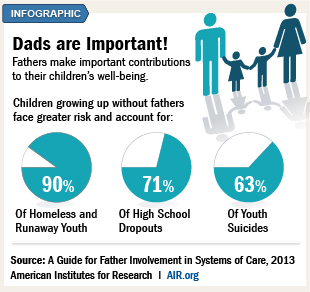Guide for Father Involvement in Systems of Care
Fathers are important to the development and well-being of their children. Coinciding with Father’s Day, the Technical Assistance Partnership for Child and Family Mental Health released an updated Guide for Father Involvement in Systems of Care* to share information about the positive influences of fathers on their children’s lives and potential negative consequences when they are not involved. The guide offers strategies for systems and families to help fathers become more involved.
Studies consistently show that children with involved, loving fathers are much more likely to do well in school; have healthy self-esteem; exhibit empathy and pro-social behavior; and avoid high-risk behaviors—such as drug use, truancy, and delinquent activity—than children who have uninvolved fathers (Horn & Sylvester, 2002). Financial support from fathers is important, but data show that outcomes improve through both their monetary contributions and high-quality interactions with their children.
 New generations of fathers, including those from different ethnic/racial groups, are engaging in a “new fathering” paradigm that takes the best from what they were taught and combines it with what they strive to be as fathers. The guide specifically addresses strategies for working with Hispanic/Latino, African American, and Native American fathers. It provides tips about involving grandfathers; fathers who are young; gay, bisexual, transgender, and questioning fathers; and those in families who are involved in the child welfare system. The guide also addresses challenges of working with dads who are incarcerated, and those who are involved in substance abuse.
New generations of fathers, including those from different ethnic/racial groups, are engaging in a “new fathering” paradigm that takes the best from what they were taught and combines it with what they strive to be as fathers. The guide specifically addresses strategies for working with Hispanic/Latino, African American, and Native American fathers. It provides tips about involving grandfathers; fathers who are young; gay, bisexual, transgender, and questioning fathers; and those in families who are involved in the child welfare system. The guide also addresses challenges of working with dads who are incarcerated, and those who are involved in substance abuse.
The Guide for Father Involvement in Systems of Care was produced as a part of the Technical Assistance Partnership’s Fatherhood Initiative which promotes culturally and linguistically responsive, father-friendly engagement in systems of care for children and youth with mental health needs. The aim of the Fatherhood Initiative is that more fathers will be welcomed and engaged in ways that support personal, child, and family well-being. Learn more about the Fatherhood Initiative and building systems of care to meet the mental health needs of children, youth, and families.
The Technical Assistance Partnership for Child and Family Mental Health provides technical assistance to system of care communities funded to operate the Comprehensive Community Mental Health Services for Children and Their Families Program. The Technical Assistance Partnership is a collaboration between AIR and the National Federation of Families for Children’s Mental Health. It is funded by the Substance Abuse and Mental Health Services Administration of the U.S. Department of Health and Human Services.
Notes and References
* A "system of care" is an organizational philosophy and framework that involves collaboration across agencies, families, and youth to improve access and expand the array of coordinated community-based, culturally and linguistically competent services and supports for children and youth with a serious emotional disturbance and their families. Find more information about systems of care from the Child, Adolescent and Family Branch, Center for Mental Health Services, Substance Abuse and Mental Health Services Administration, U.S. Department of Health and Human Services.
Horn, W. F., & Sylvester, T. (2002). Father facts (4th ed.). Gaithersburg, MD: National Fatherhood Initiative.